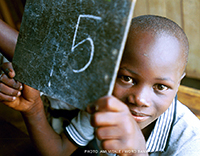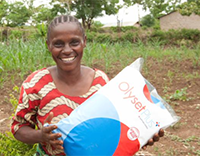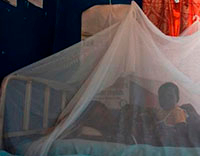2015
Statement on the Occasion of World Malaria Day 2015
by Ray Chambers
Dear Friends and Colleagues,
On the occasion of the final World Malaria Day of the MDG era, allow me to say, simply and with a full heart, thank you.
 The achievements made by the malaria community over the past 15 years have been unprecedented in global health. Together you have tackled one of humanity’s greatest scourges and helped propel us towards bringing this ancient enemy to its knees. Your collective efforts have reduced malaria deaths in children by 53%, prevented 670 million malaria cases overall, and saved more than 4.3 million lives between 2000 and 2013, effectively returning billions back to economies and bringing incalculable joy to families and communities that have benefited from your work. Malaria progress accounts for 20% of the gains made in reducing preventable child deaths under the MDGs.
The achievements made by the malaria community over the past 15 years have been unprecedented in global health. Together you have tackled one of humanity’s greatest scourges and helped propel us towards bringing this ancient enemy to its knees. Your collective efforts have reduced malaria deaths in children by 53%, prevented 670 million malaria cases overall, and saved more than 4.3 million lives between 2000 and 2013, effectively returning billions back to economies and bringing incalculable joy to families and communities that have benefited from your work. Malaria progress accounts for 20% of the gains made in reducing preventable child deaths under the MDGs.
 Each of us came to work on malaria for a unique and personal reason. For me, the journey began when I was shown a photo of beautiful children who I thought were sleeping peacefully but were, in fact, each lying in a malaria coma. This spurred me to get involved, as I came to understand that saving millions of lives was possible, but only if we could pull the right levers. We had the tools we needed to prevent, diagnose, and treat malaria, but we needed more: More funding, better planning, and greater political will. I can honestly say that the single best investment I’ve made over a long business career has been the time, resources and energy I committed to working with you on malaria.
Each of us came to work on malaria for a unique and personal reason. For me, the journey began when I was shown a photo of beautiful children who I thought were sleeping peacefully but were, in fact, each lying in a malaria coma. This spurred me to get involved, as I came to understand that saving millions of lives was possible, but only if we could pull the right levers. We had the tools we needed to prevent, diagnose, and treat malaria, but we needed more: More funding, better planning, and greater political will. I can honestly say that the single best investment I’ve made over a long business career has been the time, resources and energy I committed to working with you on malaria.
Our malaria community is a diverse and highly interdependent one. Success is not possible without the contributions of every part of our coalition. Funding underpins everything we do, so we must acknowledge the incredible support of so many nations, organizations, private corporations and other entities, including, but not limited to, the United States, the United Kingdom, the Bill & Melinda Gates Foundation, the Global Fund and UNITAID. Thanks also to World Bank President Jim Kim for his leadership in championing innovative financing approaches for health, like performance-based structures and health bonds, that will make a big impact in our progress going forward.
Leadership has been essential to the malaria fight, and we have been lucky to have organizations like the African Leaders Malaria Alliance, the Roll Back Malaria Partnership, Malaria No More, the Asia Pacific Leaders Malaria Alliance, Medicines for Malaria Venture and the WHO malaria team setting the agenda and encouraging so many to work so hard. Thank you to WHO’s fearless leader, Dr. Margaret Chan. And of course we owe a great debt to UN Secretary-General Ban Ki-moon, who has been visionary in his championing of malaria and unwavering in his commitment to our work.
 None of our success would be possible without partners from the private sector who have, through ingenuity and generosity, created and delivered so many of the tools and products needed for this effort. Our malaria world is rich with researchers, scientists, advocates, communicators, health workers, and millions of individuals, near and far, who care about seeing an end to needless human suffering. Let’s make sure we remember how privileged we are to be working together. The work of publications like the Financial Times, The New York Times, The Wall Street Journal, The Lancet and hundreds of outlets around the globe has been essential to supporting the political, economic and social will necessary to win a battle like ours.
None of our success would be possible without partners from the private sector who have, through ingenuity and generosity, created and delivered so many of the tools and products needed for this effort. Our malaria world is rich with researchers, scientists, advocates, communicators, health workers, and millions of individuals, near and far, who care about seeing an end to needless human suffering. Let’s make sure we remember how privileged we are to be working together. The work of publications like the Financial Times, The New York Times, The Wall Street Journal, The Lancet and hundreds of outlets around the globe has been essential to supporting the political, economic and social will necessary to win a battle like ours.
The task ahead will surely be more difficult than the one behind us – but we can prevail. We must remain diligent in the malaria fight because if we let up, we will watch our hard-won gains vanish. The evidence is indisputable that when we cut back on funding or wane in our commitment to protecting everyone at risk, we suffer devastating setbacks and loss of life.
Malaria control has been proven to be one of the best investments in global health. The return on investment is simply indisputable. According to the Copenhagen Consensus, which has been ranking activities in terms of return on investment for the post-2015 Global Goals for sustainable development, malaria control delivers $36 in social and economic benefits for every dollar spent. Meaning, for a $5 bed net, $180 is returned to the economy. Let’s make sure that going forward, we shift the discussion from one of costs, to one of return on investment and value for money.
The pipeline of new malaria prevention tools and technology is the strongest it has ever been, signaling that an end to malaria is within reach as some of these needed tools prove viable. As we embrace a new and more expansive set of post-2015 goals for sustainable development, the malaria community stands on a solid foundation for taking on the hard work ahead.
 Ultimately, we must make it our mission to end malaria for good. A moonshot, perhaps. But we in the malaria community reach big. Eradication is a goal we know we can achieve if we can secure the funding commitments, unlock the innovation, and agree to ambitious but achievable plans that will get us there. Thanks to Bill Gates for encouraging the community to keep its sights on eradication and for providing inspired malaria leadership.
Ultimately, we must make it our mission to end malaria for good. A moonshot, perhaps. But we in the malaria community reach big. Eradication is a goal we know we can achieve if we can secure the funding commitments, unlock the innovation, and agree to ambitious but achievable plans that will get us there. Thanks to Bill Gates for encouraging the community to keep its sights on eradication and for providing inspired malaria leadership.
So please join me in celebrating our success this World Malaria Day. Let’s take a moment to remember, with pride, that millions of children and adults are alive and thriving today because of your hard work. And let’s seize this moment to recommit to doing everything we can to ensure that, one day, malaria will be remembered as something we faced down through a triumph of resolve, ingenuity, hard work and immense good will.


